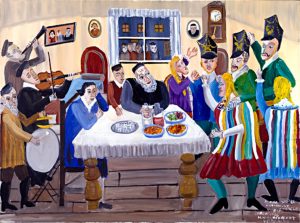

Why is this holiday called Purim? Why is it called after the lots cast by Haman to determine how best to kill the Jews.[1] All other festivals are named by a symbol of redemption: Chanukah, for the miracle of oil that burned eight days; Pesach, because death “passed over” Jewish homes, Sukkot, for G‑d’s protective presence, etc. By calling the holiday Purim we enshrine that moment of evil intent as the central theme of the day. And yet, its mitzvot of gifts, charity, costumes, and inebriation are the most light-hearted and celebratory of the year. This is a famous question with generations of answers, and now another for the record.
This day is called Purim because its inner service is lots. There is a whole body of teachings about how to cast them. Every spiritual practice requires this expertise. In fact it is the limiting factor of religious life. Both Purim (פורים) and Yom Kippurim (the day that is “כ”, like Purim)[2] are in this way the same; the secret of each is the casting of lots.
On Yom Kippur the High Priest stands before two goats that are absolutely identical and assigns them polar opposite fates:[3] one will serve the forces of life and one the forces of death.[4] One will experience the highest elevation possible for an animal in this world. The other is sent to the desert, to the powers of dark, (a seemingly idolatrous act that would be strictly forbidden if not obligated by Torah as part of the Yom Kippur service).[5] One goes in to the holy of holies. One goes out to the wasteland. One rises; the other falls.
How does he decide which goes where? On the surface they are the same. How does he judge their secret fates? His guidance must come from a place beyond “mind.” In fact, it is the deep admission of not knowing that draws the light that guides the lots. HaShem appears only when space is created for Him.
On Purim we also cast lots, but of a different sort. This time the outsides are polar opposite and we must find their sameness.
Arur (cursed be) Haman – Cursed be evil and sin and all that opposes spiritual law. Cursed be suffering, sickness and lack, and all that opposes G‑d’s will-to-give-good.
Boruch (blessed be) Mordechai – Blessed be all that is holy and good; all that serves G‑d with passion and strength. Blessed be joy, bounty, and health. Blessed be all that proves G‑d’s love.
These two “goats” stand before us on Purim. They could not be more unalike on the surface. And yet, we are obligated on this day “to become so inebriated that we can’t tell the difference between them, between blessing Mordechai and cursing Haman. [6],[7]
The state of consciousness that enables this perspective is called “lots,” i.e., literally purim. One must go deeply inward (and upward) to find a place inside that transcends craving and aversion. Ones love-bond to G‑d gets so deep, one’s vision so vast, that the truest (and normally hidden) truth becomes real: Every moment is an opportunity for closeness with G‑d and it is not clear which builds intimacy more, the joy or the pain, the blessing or the curse, Mordechai or Haman. Would there be Purim without Haman? Who do we thank more for this day? It is important to note that the obligation does not entail blessing Haman or cursing Mordechai (ח”ו). The moral frame of this world never inverts. Rather, for a moment, we transcend the pleasure principle and embrace each event equally as a catalyst for deepened relationship with G‑d, regardless of its pain or pleasure.
How to Cast Lots – How to Throw Purim
Start with something you passionately desire or detest. Next find the place inside you that only wants truth. Surrender completely to the sincerity of that desire. Take whatever time you need. Hold out till you find it…you’ll know. Gather all your splintered parts and affirm this commitment with one heart. Trust in the compassionate strength of cosmic truth that fills the universe and that is infinitely bigger than you. Release all resistance and personal agenda. Accept the facts of your life as simply, “true.” They just “are,” and that is their truth. Trust the unfolding. Then come back to this world with its preferences, prayers and visions; with its desires and aversions. These, too, are good and true. Run back and forth between these two “minds” and feel each fully.
Know, that like Purim, the final chapter of each soul-journey will be so sweet that it will reframe all the ordeals that preceded it. Without exception we will all declare with whole and joyous hearts: What a small price to pay for eternal bliss.
[1] Pur (singular), purim (plural) means literally, lots. See Esther 3:7, 9:24, 9:26.
[2] See PurimThemes, p. 17.
[3] Lev. 16:8; see Rashi there.
[4] Ramban on Lev. 16:8.
[5] R. Tsadok HaKohen, p. 15 (para. 40).
[6] See PurimThemes, p. 18.
[7] TB Megilla 7b.